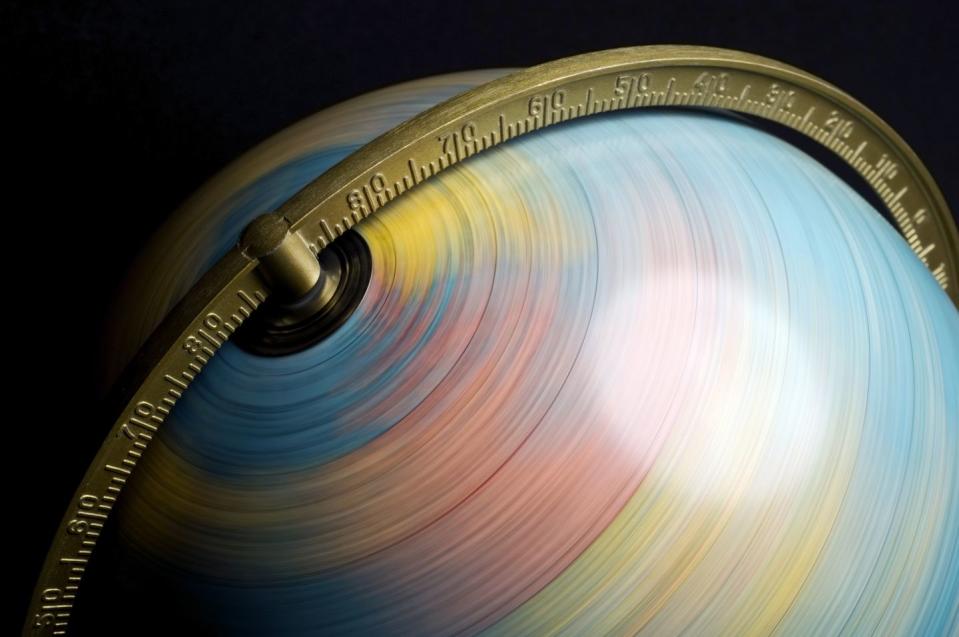Earth Is Spinning Faster Than Usual, Giving Us the Shortest Day EVER Recorded

On June 29, Earth experienced its shortest-ever day—1.59 milliseconds less than 24 hours.
The apparent speed-up of Earth’s rotation could be attributed to the “Chandler Wobble.”
This minuscule change in time could introduce the need for a negative leap second.
If it seems like the world is moving fast, know that it truly is.
On June 29, the National Physical Laboratory in England recorded the shortest day in history: 1.59 milliseconds less than 24 hours. And Earth’s quick-spinning day earlier this summer isn’t a one-off fluke, either.
🌍 Science explains the world around us. We’ll help you make sense of it all—join Pop Mech Pro.
Using data from the International Earth Rotation and Reference Systems Service, timeanddate.com says 2020 boasted 28 of the world’s shortest days on record since the introduction of the atomic clock in the 1960s made the measurement more scientifically accurate. Earth’s hastened rotation has continued to speed up compared to the average in 2021, leading to 2022’s record for the shortest-ever day recorded. (July 26 nearly eclipsed the record, too.)
If Earth’s rotational speed trend continues, scientists may want to introduce a negative leap second, which could help compensate for the shorter days we experience as a result. But that could lead to technological issues, according to a July 25 Meta post.
“The impact of a negative leap second has never been tested on a large scale; it could have a devastating effect on the software relying on timers or schedulers,” Meta engineers Oleg Obleukhov and Ahmad Byagowi note in the post. “In any case, every leap second is a major source of pain for people who manage hardware infrastructures.”
But what’s with Earth’s quick-moving spin in the first place? Some blame the “Chandler Wobble.” First discovered in the late 1800s, the concept basically states Earth’s spin on its axis isn’t exacting. There’s a natural wobble in the measurement, whether because the Earth isn’t perfectly spherical, because tides change, because winds move water, or even the fact that earthquakes cause blips. Others blame the constant melting and refreezing of ice caps and other climate change factors. Scientists simply aren’t sure.
Whatever the exact reason for the Chandler Wobble (discovered by American astronomer Seth Carlo Chandler, hence the name), it only really impacts astronomers and pinpoint Global Positioning System navigation.

But to keep time marching on, a long-term slowdown of Earth’s spin decades ago led to the introduction of the leap second in 1972. Since then, 27 leap seconds have been added to keep the Coordinated Universal Time updated. But if Earth’s rotation really is speeding up, not only does that make the addition of a leap second obsolete, but poses the potential for a negative leap second to keep Earth’s dance in step with time.
That’s why Meta wants to abolish the positive leap second and avoid both it and any discussion of a negative leap second.
“The leap second and the offset it creates cause issues all over the industry,” the engineers write. “Leap second events have caused issues across the industry and continue to present many risks. As an industry, we bump into problems whenever a leap second is introduced. And because it’s such a rare event, it devastates the community every time it happens. With a growing demand for clock precision across all industries, the leap second is now causing more damage than good, resulting in disturbances and outages.”
While engineers clamor for the abolition of the leap second, period, scientists are still trying to figure out just why Earth’s rotational speed is changing. Of course, Earth could slow back to a more average speed and the worry subsides. Or, in a more extreme scenario, the world begins spinning even more quickly.
You Might Also Like

 Yahoo Finance
Yahoo Finance 